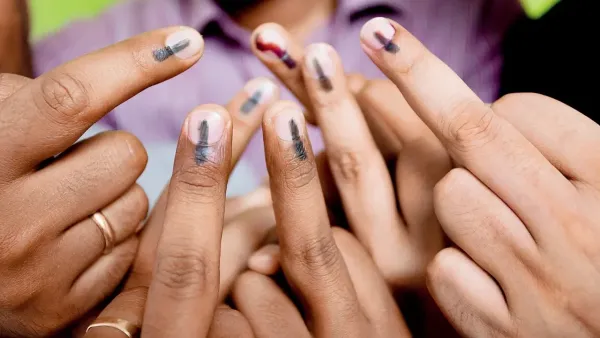Just what is the Election Commission of India hiding about voter lists?
admin | August 11, 2025 11:22 AM CST

In June 2025, the (ECI) launched a special campaign in Bihar to 'clean up' voter lists, citing the presence of ineligible or duplicate names — possibly even foreign nationals — in the rolls.
While this may appear reasonable, it raises a deeper question in places like Mumbai, where elections are often decided by narrow margins: how did such names enter the lists in the first place?
The answer, revealed through Right to Information (RTI) requests (copy with mid-day) filed by the Commonwealth Human Rights Initiative (CHRI), a Delhi-based civil liberties group, points to something more troubling — the ECI not only evading accountability but possibly obstructing it.
On June 24, the ECI ordered a (SIR) in Bihar to remove ineligible voters. Legally, enrolment requires an application, public notice, time for objections, and verification, before approval by an electoral registration officer (ERO) or assistant ERO (AERO). If such names still slip through, it reflects negligence or wilful failure by these officials.
Venkatesh Nayak, director, CHRI
CHRI, led by transparency advocate Venkatesh Nayak, filed an RTI on June 27, asking what legal action applies to erring EROs/AEROs, who can initiate it, and how many cases exist since January 2015. The ECI replied 35 days later — missing the deadline and sidestepping the questions.
The ECI Central Public Information Officer (CPIO), Shilpi Srivastava, vaguely cited Section 32 of the Representation of the People Act, 1950, a general penal clause for breach of duty. She said the RTI Act did not require legal interpretation or hypothetical answers. For the other two questions, she claimed the information was unavailable and told CHRI to approach state-level officers, refusing to transfer the RTI to them, as the law mandates.
Why it matters?
“Section 32 deals with punishment for not performing official duties properly, but it’s too general to address something as serious as adding ineligible or foreign names to voter rolls. The CPIO made no mention of the (BNS), 2023, replacing the Indian Penal Code, which includes provisions for fraud and falsification of official records,” said Venkatesh.
“More tellingly, the ECI did not say whether any law, old or new, has been used against officials in such cases, despite flagging the problem in its own June order. Has no action been taken since 2015? Or is the ECI shielding its own officers?” Venkatesh questioned.
Second RTI
“In early 2025, soon after a new took charge, the ECI claimed to have intensified public engagement, holding over 4700 meetings with political party representatives nationwide, led by chief electoral officers (CEOs), district electoral officers (DEOs), and EROs,” said Venkatesh.
“A press release dated April 1, 2025 even broke it down: 40 meetings by CEOs, 800 by DEOs, and 3879 by EROs. Each CEO, it said, would submit action taken reports (ATRs) to the ECI,” said Venkatesh.
“When I filed an RTI on April 25, asking for meeting dates, agendas, attendees, ATRs, and related files, the ECI claimed it had none of the information. It told CHRI to contact State CEOs and refused to forward the RTI, arguing that CEOs are separate public authorities,” said Venkatesh.
“If the ECI’s own press release says ATRs were to be submitted to them, how can they now deny their existence? Were the reports never filed? Are they missing? Or is the ECI refusing to acknowledge them? Either way, it signals a serious accountability gap,” asked Venkatesh.
Why should Mumbai care?
“Bihar may be far from Mumbai, but the stakes are the same. Elections here are often decided by razor-thin margins. Trust in the electoral process is not just a bureaucratic detail, it’s the foundation of democracy. If names can be added or deleted without scrutiny, if officials face no consequences, and if basic questions go unanswered, the integrity of elections is at risk,” Venkatesh said.
A pattern of secrecy
This is not an isolated case. CHRI says the ECI routinely rejects appeals without explanation. Second appeals to the central information commission are delayed for months, sometimes years, due to chronic understaffing. As of mid-2025, eight posts were vacant.
What next?
“It’s time for citizens, civil society, and political parties to: demand answers, push for transparency, hold institutions accountable, because democracy is not just about casting a vote, it’s about asking hard questions and refusing to be ignored,” Venkatesh concluded.
READ NEXT
-
Jr NTR On Entering Bollywood With War 2: ‘Every South Indian Has A Doubt'

-
Nvidia, AMD To Share 15% Of China AI Chip Sales Revenue With US In New Export Deal

-
iPhone 17 Pro Max Likely To Get 'Largest Battery Ever' By Apple, Camera To See Major Upgrades As Well

-
Perplexity’s Comet AI Browser To Get Zerodha Integration? This Brief Exchange Between Aravind Srinivas And Nikhil Kamath Has Got The Internet Buzzing

-
India’s AI Tech Spending Projected To Reach Rs. 92 Thousand Crore By 2028: Report
